In partnership with USAID, community owned and managed game ranches are sharpening their skills in wildlife resource management
Zambia’s landscape is ideal for antelope. Between the rainy and dry seasons, over 25 species—from the fox-sized duiker to the 1,500-pound eland—graze across Zambia’s landscape. These unique scenes bring tourism revenues to the country from visitors, photographers, and hunters seeking out these animals in and around the national parks. But there is another way these animals can provide revenue for the population: through the sale of wild game meat.
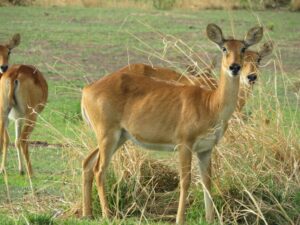
As the demand for legal game meat increases both locally and abroad, and as climate change puts increasing pressure on arable land, Zambia’s land managers are learning that some areas are better suited to raising antelope than cattle. Rather than clearing forests for crops or establishing pasture for cattle, antelope can live and thrive off the natural landscape. Better land and wildlife management can help reduce poaching, increase revenue, and protect valuable forests and watersheds.
In order for a community to have complete user rights of wildlife, a game ranch generally needs to be fenced, which is an extremely expensive undertaking. Animals need to be protected from poaching, and in many locations animals must be restocked or habitats need to be improved in order for animals to thrive. USAID partners with the Wildlife Producers Association of Zambia (WPAZ) to support the legal game meat value chain and increase the number of communities on private and customary land that raise game meat. WPAZ, with USAID support, can help fledgling community game ranches navigate this process, building on their work with over 60 successful wildlife game ranches in the country. Community game ranches offer communities the chance to earn additional revenue from better land and wildlife management, benefitting both community wellbeing and the country’s larger conservation and biodiversity goals.
As the number of commercial game ranches increases across Zambia’s countryside, several rural communities are attempting to secure their forested land and manage it for wildlife production rather than converting it to cropland. These community game ranches are typically located in areas outside of national parks, but in locations where wildlife are present. WPAZ helps these communities increase management capacity and navigate regulatory processes related to using wildlife in a sustainable way.
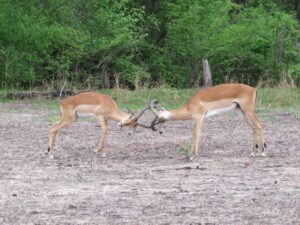
Nyalugwe Community Game Ranch is located in the Luangwa Valley in Eastern Province and operates with help from Community Markets for Conservation (COMACO), a WPAZ supported social enterprise that supports wildlife conservation and small-scale farmers in Eastern Zambia. Communities in the area have registered as a Community Forest Management Group to secure community rights over 45,000 hectares of land, which will be utilized to protect forests, promote the return of wildlife to the area, and support a community game ranch. The chance to diversify how it uses land, including by raising wildlife, could bring opportunities for Nyalugwe’s community, which is already well versed in sustainable agriculture practices. Nyalugwe game ranch leaders recently participated in a weeklong peer-to-peer exchange visit where WPAZ members and existing commercial and community game ranch operators shared information and lessons learned with newcomers about how to develop a sustainable game ranching model.
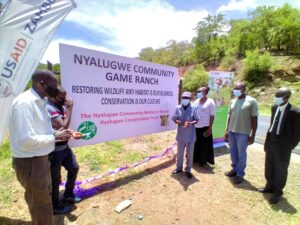
“Nyalugwe has great potential considering their location and habitat,” explained Thawanda Masiye, Projects and Administration officer at Wildlife Producers Association of Zambia (WPAZ). “Until now, what they knew about game ranching, they learned by word of mouth and trial and error. Now, Nyalugwe would like to see continued support from WPAZ, but first we would like to see the chief’s buy-in to the community game ranch project.”
The week-long workshop included three days of intensive seminars dealing with topics like wildlife management, animal welfare, on-farm income generation activities and alternative land use diversification potential. The seminars were led by WPAZ members, WPAZ Secretariat, and their Livestock Services team. In order to reinforce messaging, after each seminar, summaries were made in the Lunda and Chewa local languages.
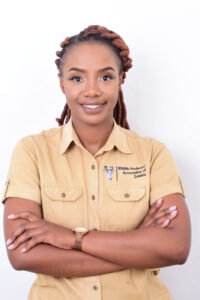
“The creation of a community game ranch can be slow, and there are no returns for at least five years. That is why it is important to think about what you are doing with your land and consider alternative land uses to provide income during those initial set-up years,” said Masiye.
Participants also visited Kushiya Game Farm, a private wildlife estate, and the Simahala Community Conservancy, a 23,000+ hectare preserve home to water buffalo, wildebeest, waterbuck, impala, and zebra, to learn from the experience of others.
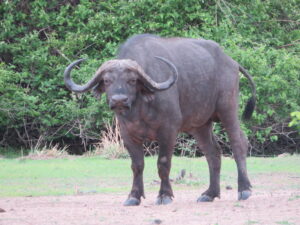
“It is clear that at Simalaha, the community understands the value of wildlife, not just as a commodity that can be grown and eaten, but as an investment. They have a sense of community, ownership, and responsibility,” explained Masiye.
The exchange visit was the final push the community needed to convince them that game ranching can be a viable business undertaking and a good use for land in their community.

According to Elisa Daka from the Nyalugwe Community Game Ranch who attended the training, “The training was good as it imparted new knowledge that we needed for us to run our new community game ranch and we are grateful to WPAZ for organizing the training and hope it can be extended to all community game ranches in the country.”
With the help of WPAZ and USAID, Zambia’s natural resources can be preserved while empowering the local communities.

